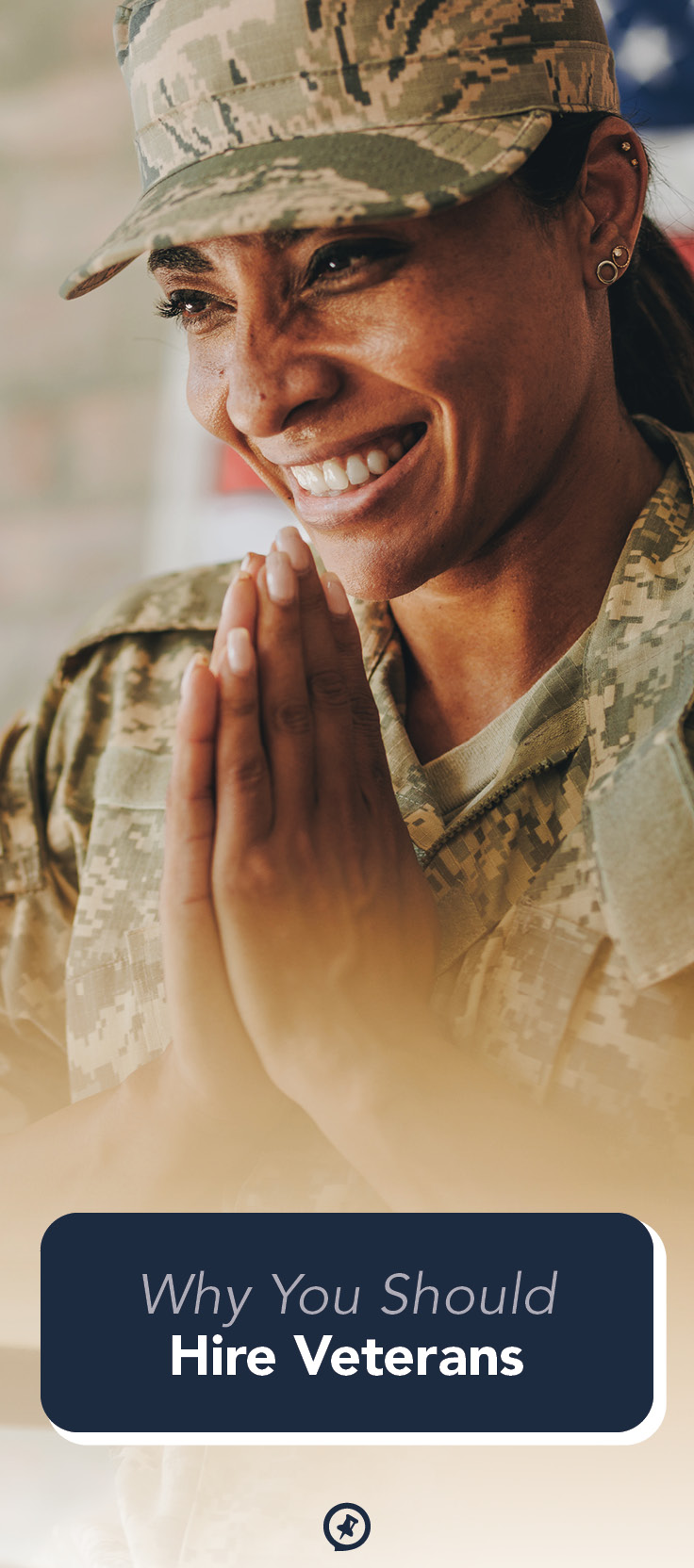Why You Should Hire Veterans
Veterans of the US Armed Forces represent some of the best-equipped individuals for the business world, poised to offer various workplaces a unique range of skills.
Veterans have sacrificed their time, safety, and freedom to join the collective effort of protecting the United States and its allies. But once members of the US Armed Forces reintegrate into the civilian world, you should make a concerted effort to bring them into your organization— no matter your industry. After all, they have developed special skill sets in some of the world’s most rigorous positions and very well may prove themselves to be your greatest workplace assets.

Committed to the cause
Uniforms aren’t all that unite service members; teamwork is a core tenet of what makes for a capable military. Take the seven core Army Values, for example, a list of principles featuring loyalty as one of its most vital aspects. “A loyal Soldier is one who supports the leadership and stands up for fellow Soldiers. By wearing the uniform of the U.S. Army you are expressing your loyalty. And by doing your share, you show your loyalty to your unit.” In fact, the term “wingman,” to mean a reliable friend and confidante, originates from legions of fighter pilots traveling in formation.
This sense of commitment, drilled into servicepeople from their first days of basic training, can benefit an entire organization. Like trainees conducting the common pole-bearer exercise, in which several individuals must collaborate to carry a heavy object to a designated goal point, veterans will prioritize teamwork, extending a helping hand to coworkers who are swamped with tasks or offering to help a colleague improve a project that faced criticism. If a team runs dangerously close to missing a deadline or your organization is falling short of its revenue aims, expect a veteran to step up to the plate. Their efforts will help ensure that everyone achieves their goals.
Regimented Long after they leave behind the world of exercise drills and precisely donned uniforms—spaces where even a messy collar can earn you demerits—veterans retain their commitment to following rules and maintaining order. “Veterans will be the most punctual employees you’ll ever meet,” says Easterseals, a nonprofit that assists veterans in achieving job placement, among other services. “Exceptional organizational skills are ingrained in them from their service.” If you’re looking to hire disciplined individuals who are timely with their promptness, dedicated to completing their vital tasks, and neat and orderly where it counts, look no further than a veteran. You can also trust these employees with helping to execute strategies from upper management, investors, or other positions of authority exceptionally well. After all, the military is one of the few workplaces where people literally wear their rank on their sleeve, so a veteran will understand and accept their role within a system of leaders and perform their tasks accordingly.
Lead like no one else
However, don’t expect these individuals to blend into the background. As they rise from rankand- file recruits to leaders during their service terms, they develop some of the strongest management skills you could ever hope to encounter. “You learn how to lead a team to accomplish the mission,” writes Paul A. Dillon, a former US Army reserve officer and Vietnam War veteran who now leads his own management consulting firm. “If you can’t do this—if you can’t forge your troops into an effective fighting force—you’re mustered out of the service quickly.”
Service people are trained to lead the charge in the most high-stakes situations, and they can apply these unifying and strategizing skills to virtually any workplace. That doesn’t mean, though, they fit the stereotype of a drill sergeant barking orders. “Service in the military makes you understand the concept of ‘servant leadership’ perfectly,” Dillon continues. “An officer doesn’t eat until all his or her troops have eaten. An officer is the last to sleep and walks the perimeter of the camp to ensure that their troops are safe and sound.” In other words, they lead by shouldering responsibilities, not passing them on.

Quick on their feet
In the US military, workplace complications or hazards have potentially devastating effects, not only for individuals but also for their companions—and potentially even the nation. For these reasons, members of any service branch are taught to assess their situation, think quickly, then take immediate action to solve any crisis.
Naturally, your workplace will present a lower-stakes environment than a battlefield, but a veteran employee will still treat a client complaint or loss in revenue like an obstacle that must be addressed with haste. Did a vendor threaten to raise your fees? Trust the veteran on your payroll to either negotiate a better rate with them or find a more affordable alternative. Did a marketing campaign underperform? A veteran on your team may step up to review metrics and explore alternative tactics with the potential for greater ROI. Rather than being overwhelmed or stumped by a crisis, they will seek solutions to tackle these barriers with impressive resolve.
Hiring a veteran
If you’re interested in leveraging the diverse skills and experiences these selfless individuals have developed, start by conducting some outreach measures. For example, participate in veteran job fairs, collaborate with placement services such as Easterseals, and actively seek out applicants with prior military service on job boards or at recruiting events. (You can learn more about onboarding veterans starting on page 34.) If you embrace a veteraninclusive hiring strategy, you can not only support those who have served and sacrificed but also access a pool of uniquely skilled individuals who can contribute considerably toward your organization’s success.
TAKE ACTION:
Consider staffing an armed forces veteran on your team to satisfy existing job vacancies or fulfill your personnel expansion objectives.


















